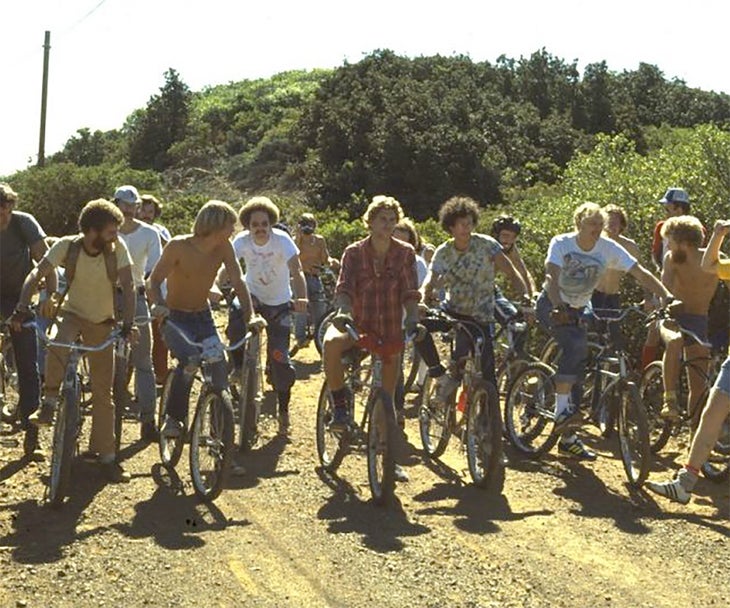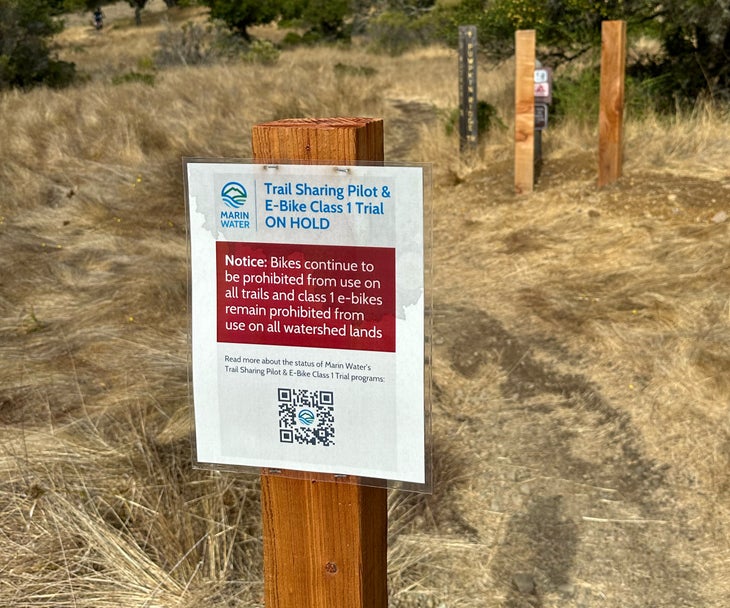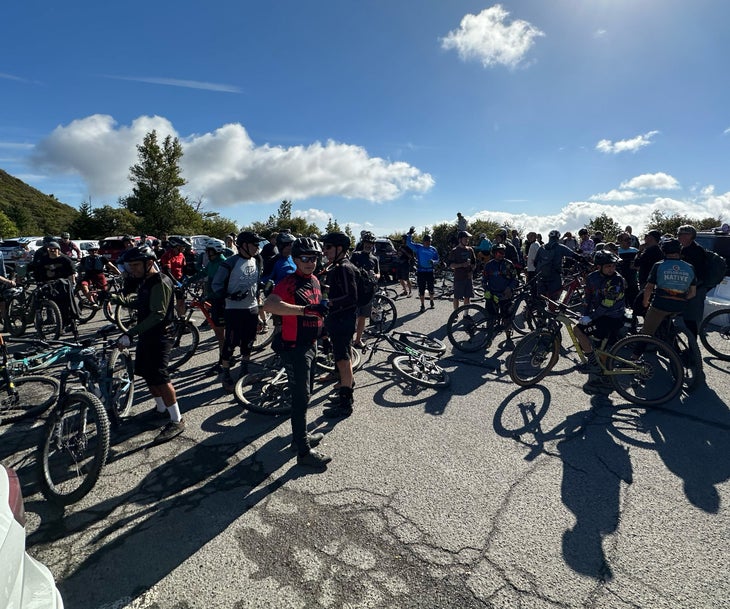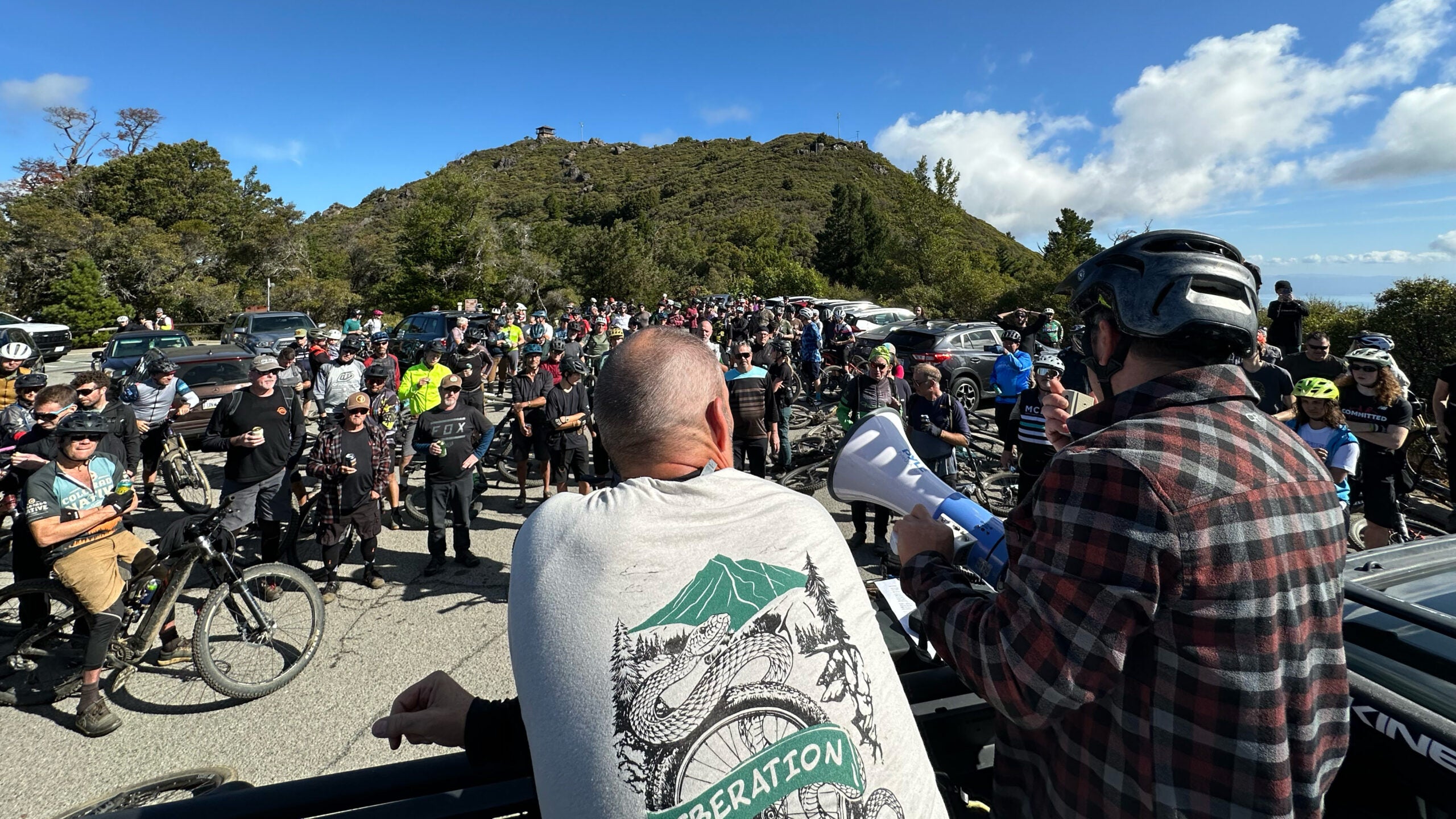From the top of California’s 2,579-foot Mount Tamalpais, one can gaze out at a commanding view of San Francisco, the Pacific Ocean, and the Golden Gate Bridge. But it wasn’t the overlook that lured 200 mountain bikers to the mountain on the crisp morning of Saturday, November 2.
The cyclists had ridden to the summit on paved and dirt roads in an organized protest. They wanted to show local authorities that mountain bikers deserve to ride on the local trail system—the same dirt paths where mountain biking was born nearly 50 years ago.
“I’m here to free Mount Tam,” Andy Scott, a 59-year-old cyclist from nearby San Anselmo, told �����ԹϺ���. “It was once inhabited by all users, and now only by a limited few.”
Mountain biking has been prohibited on the trails since the mid-eighties, but recent efforts to open the trails back up to cyclists have been gathering steam.
The protest, which was labeled “Liberate Mount Tam” by its organizers, came on the heels of a controversial lawsuit and subsequent court order that had stymied their access to the trails. In April, the Marin Municipal Water District, the government agency that manages much of the public land on the mountain, approved two pilot programs to allow cyclists access to 6.6 miles of trails on the peak.
The approval came after six years of planning, community outreach, studies, and lobbying by local cycling advocacy groups. The trails were set to open to mountain bikers Friday, October 4.
But the afternoon before the opening, a judge issued a temporary restraining order that halted progress. Three local environmental groups—Marin Conservation League, California Native Plant Society, and Marin Audubon—filed a lawsuit to block the plan. They argued that the Water District failed to comply with the California Environmental Quality Act, which requires public land managers to investigate and then publish the impact of a wide range of projects, from trail building to forest thinning.
The lawsuit did not sit well with the mountain bikers or the cycling advocacy groups.
“The Marin County Bicycle Coalition has gone out of its way to collaborate with Marin Conservation League and others over the years in an earnest desire to hear and understand their concerns,” said Krista Hoff, the off-road director of the local advocacy group Marin County Bicycle Coalition (MCBC). “They are not interested in equitable access.”
But officials from environmental groups disagree, and say they are simply doing what’s right to protect Mount Tamalpais’s ecology from damage. “The Marin Conservation League’s interest is in moderating growth in intensity of recreation so that it does not cause further impacts,” says Nona Dennis, president of the Marin Conservation League. “All recreation has an impact on the environment.”
The development is just the latest skirmish in a decades-long war that cyclists have waged to legally ride the trails in mountain biking’s birthplace.
How Mountain Bikes Were Chased Off Mount Tamalpais
In the seventies, a rag-tag group of local cyclists including Gary Fisher, Joe Breeze, Wende Cragg, Charlie Kelly, and Otis Guy modified beach cruisers and rode them down the trails and fire roads on Mount Tam. The group ” and their adventurous rides helped launch modern mountain biking.
But many Marin County locals didn’t like cyclists riding the trails. Citing environmental and safety concerns, well-organized groups attended town meetings and wrote to their elected officials, asking to ban the new form of recreation. By 1984, local authorities officially shut down Mount Tam’s trails to cyclists.

“We really couldn’t understand the hostility from the land managers,” Otis Guy, who is now 71 years old and was at the recent November protest, told �����ԹϺ���. “We care about these lands. We should be considered an asset, not a threat.”
Similar rules spread across California and the country in the eighties and nineties. Disputes over trail usage often pitted mountain bikers against hikers and equestrians, with the latter user groups regularly gaining the upper hand. In Marin and nearby Alameda County, rules restricted bicycles to dirt maintenance roads, which are 12-to 15-feet wide, and usually steep. The single-track trails, meanwhile, were off-limits.
The loss of trail access prompted in 1988. Called the International Mountain Biking Association, or IMBA, it advocated for cyclists’ access to trails, and showed local mountain biking communities how to build and manage trail systems.
Local cycling advocacy groups like Access 4 Bikes and MCBC also pressured Marin officials to allow cyclists onto the trails. These groups helped mountain bikers gain access to other trail systems in Marin County in the early 2000s. But the dirt trails on Mount Tam remained off-limits.
“We’re still fighting the same stupid battles today,” Guy said. “IMBA showed the world years ago how to build trails, and it’s been done with no [negative] impact across the country. But Marin County is a different place.”
A Process That Took Years to Complete
The pilot program to allow mountain bikes on Mount Tam took six years to come together.
Biking advocacy groups also worked to nominate cycling-friendly managers onto the Marin Water District’s board of directors. Since 2020, Bill Keene, a board member for the cycling advocacy group Access 4 Bikes has knocked on approximately 2,000 doors in Marin County to stump for bike-friendly candidates for the water board.

Both Access 4 Bikes and the Marin County Bicycle Coalition persuaded their members to attend local hearings, board meetings, and community hikes, and to write letters on behalf of cyclists. The advocacy work paid off. In April, the board voted unanimously to approve the two pilot programs for the 6.6-miles of trail: one for regular mountain bikes and another for e-mountain bikes.
Officials from bike advocacy groups told �����ԹϺ��� that the local environmental groups were part of the planning process and had years to raise concerns. “They were at the meetings, they had a seat at the table,” Guy said. “This is how cooperative people and processes work.”
But representatives from environmental groups told �����ԹϺ��� that the Marin Water District failed to provide detailed reports on how mountain biking would impact the flora and fauna on Mount Tamalpais during this process.
Dennis told �����ԹϺ��� that the Marin Water District also failed to disclose which trails or roads would be open to cyclists until 2024.
“The first two to three years were mostly talk, with no reference to any specific roads or trails on the watershed, nor even tentative improvement proposals” Dennis said.
The lawsuit claims that the water district’s land “contains critical biological resources, including dozens of rare plant species and plant communities,” and that “the addition of mountain bikes and e-bikes to these trails and roads has the potential to harm these resources.”
Dennis said that the Marin Water District failed to acknowledge that some e-bikes motors emit a high-frequency noise that can disrupt bat colonies. And the plan didn’t explain how the increased use would impact the northern spotted owl, a threatened species.
“A CEQA review would have included such analyses, and furthermore, would allow for public comment,” she said.
The Marin Water District declined a request for an interview. But in a press release, a spokesperson for the water district said it took the requisite steps asked for prior to approving the mountain biking pilot program. “The District worked hard to assess watershed trail conditions, monitor trail use data and engage with a range of user groups in order to design trial programs that allow for expanded recreational interests without compromising our number one priority—protection of our community’s drinking water and the biological diversity that exists within this incredible natural resource,” the release said.
Keene, who oversees advocacy for Access 4 Bikes, said the lawsuit caught the cycling groups by surprise. “Marin Conservation League indicated they would not sue,” he said. “Pilot trails were selected to avoid environmentally sensitive areas and the litigants know this.”
But Dennis said her group made no such promise. Instead, she says her group sent a letter to the Marin Water District prior to a hearing in early September warning of a potential legal challenge. When the Water District approved the pilot program, Dennis said her group felt like it had no other option.
“The MCL Board determined we had only one recourse: that is, to join the other two non-profits as a co-plaintiff,” she said. “In our view the district’s failure to conduct adequate CEQA review before opening the trails to bikes, was an abuse of CEQA.”
The Pilot Programs Are Stalled but Not Dead
�����ԹϺ��� attended the November 2 rally on Mount Tamalpais and spoke to more than a dozen cyclists in attendance. At the November 2 rally, many of the cyclists expressed their dismay.

“There are dams on Mount Tam, there are miles upon miles of roads, there was a train to the top,” said Vernon Huffman, president of Access 4 Bikes. “You can’t tell me that this place is free of human impact and that bikes are an environmental harm.”
But for the time being, the status quo remains on Mount Tamalpais. No e-bikes are allowed anywhere in the watershed—even on fire roads—and bicycles are forbidden on the singletrack trails. The pilot programs are on hold indefinitely. In December, a Marin County judge strengthened the environmental groups’ position by issuing preliminary injunctions on both the e-bike and singletrack pilot programs.
The injunction doesn’t entirely kill the program, but it will prevent it from happening in early 2025.
Whether or not this setback deters the mountain bikers on Mount Tamalpais is yet to be seen. Hoff wrote a letter to the Marin Independent Journal saying she was hopeful that “the case will be decided in favor of more equitable recreational opportunities for people who ride.”
Atop Mount Tam on November 2, Keene and Huffman stood in the bed of a pickup truck and addressed the cyclists from a bullhorn.
“This is the way to take back Tam!” they yelled.
The crowd responded with a chant that pinged across the parking lot “Liberate Tam! Liberate Tam!”


